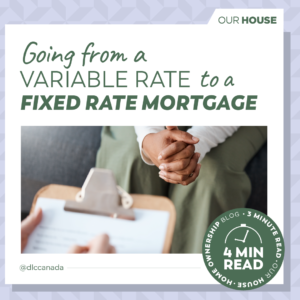
|
|
|

|
||||||||||||||||||||||||||||||
|
For all your mortgage needs contact us today 705-349-0502
Jennifer Koop & Susan Bloom, Mortgage Agents Huntsville, Muskoka
Dominion Lending Centres, Mortgage Brokers Huntsville, Muskoka
Each Office Independently Owned & Operated

Posted by: Jennifer Koop

|
|
|

|
||||||||||||||||||||||||||||||
|
For all your mortgage needs contact us today 705-349-0502
Jennifer Koop & Susan Bloom, Mortgage Agents Huntsville, Muskoka
Dominion Lending Centres, Mortgage Brokers Huntsville, Muskoka
Posted by: Jennifer Koop
 7 Tips to Makeover Your Backyard!
7 Tips to Makeover Your Backyard!As we gear up for the approaching summer season, why not revitalize your outdoor area to bask in the warmth and embrace the sunshine? There’s a plethora of fantastic outdoor projects awaiting, whether it’s in your backyard or on your balcony, to elevate your space and maximize your enjoyment of the season.
Let’s explore some fresh ideas:
Remember, regardless of the size or layout of your outdoor space, infusing it with your unique style can significantly elevate your enjoyment. Seize the opportunity to curate your personal oasis and savor the season to the fullest!
Published by DLC Marketing Team
For all your mortgage needs contact us today 705-349-0502
Jennifer Koop & Susan Bloom, Mortgage Agents Huntsville, Muskoka
Dominion Lending Centres, Mortgage Brokers Huntsville, Muskoka
Up Next: Why the CHIP Reverse Mortgage is an excellent solution for debt consolidation
Posted by: Jennifer Koop
 Why the CHIP Reverse Mortgage is an excellent solution for debt consolidation.
Why the CHIP Reverse Mortgage is an excellent solution for debt consolidation.Keeping up with rising living costs can be particularly challenging when you’re on a fixed income with limited cash flow. Many Canadians are taking out loans, using multiple credit cards, and delaying significant purchases to stay financially stable in retirement. However, juggling debts from different sources with varying interest rates and payment schedules can be stressful, leading Canadians to turn to debt consolidation loans to manage their finances and reduce stress.
What is debt consolidation?
Debt consolidation involves paying off debts using a single, lower interest loan. This approach significantly reduces the interest you pay and it offers the convenience of handling just one monthly bill instead of several.
Is Debt Consolidation Right for Me?
Many Canadians consider debt consolidation for various reasons, including:
The CHIP Reverse Mortgage: An Effective Debt Consolidation Solution
The CHIP Reverse Mortgage is a loan secured against the appraised value of your home. It is designed exclusively for Canadian homeowners aged 55 years and better and can be an effective debt consolidation solution for several reasons, such as:
Consolidate your high-interest debts, stay in your home, and enjoy tax-free cash to finance a more fulfilling retirement. To learn more about how the CHIP Reverse Mortgage can serve as a powerful and flexible tool for consolidating debt, contact Jennifer Koop, your Dominion Lending Centres mortgage expert.
*As long as clients keep their property in good maintenance, pay their property taxes and property insurance and their property is not in default. The guarantee excludes administrative expenses and interest that has accumulated after the due date.
Published by DLC Marketing Team
For all your mortgage needs contact us today 705-349-0502
Jennifer Koop & Susan Bloom, Mortgage Agents Huntsville, Muskoka
Dominion Lending Centres, Mortgage Brokers Huntsville, Muskoka
Posted by: Jennifer Koop
 Going From a Variable Rate to a Fixed Rate Mortgage.
Going From a Variable Rate to a Fixed Rate Mortgage.With the anticipation of rates going down, some homeowners may be considering switching from a variable-rate mortgage to a fixed-rate mortgage to lock in their next term.
Switching from a variable-rate mortgage to a fixed-rate mortgage can offer stability in your monthly payments, protecting you from potential interest rate hikes, along with some other benefits:
Overall, transitioning from a variable rate to a fixed rate mortgage offers stability, protection, and peace of mind, making it a favorable option for many homeowners, particularly those seeking long-term financial security.
Published by DLC Marketing Team
For all your mortgage needs contact us today 705-349-0502
Jennifer Koop & Susan Bloom, Mortgage Agents Huntsville, Muskoka
Dominion Lending Centres, Mortgage Brokers Huntsville, Muskoka
Posted by: Jennifer Koop
 Proven Strategies To Lower Your Interest Rate.
Proven Strategies To Lower Your Interest Rate.Lowering your interest rate can save you money over the life of a loan or credit card. Here are some proven strategies to help you accomplish that:
By implementing these strategies, you can potentially lower your interest rate and save money in the long run. Don’t forget to check with Jennifer Koop, your DLC Mortgage Expert also about how to make your money work for you when it comes to your mortgage!
Published by DLC Marketing Team
For all your mortgage needs contact us today 705-349-0502
Jennifer Koop & Susan Bloom, Mortgage Agents Huntsville, Muskoka
Dominion Lending Centres, Mortgage Brokers Huntsville, Muskoka
Up Next: Alternative Lending: Managing Mortgage Affordability
Posted by: Jennifer Koop
 Alternative Lending: Managing Mortgage Affordability.
Alternative Lending: Managing Mortgage Affordability.If you’re seeking a mortgage, but your application doesn’t fit into the box of the big traditional institutions, you’ll find yourself in what’s commonly referred to in the industry as the “Alternative-A” or “B” lending space.
These lenders come in three classifications:
Managing mortgage affordability in the alternative lending landscape requires careful consideration of several factors to ensure financial stability and avoid potential risks. Here are some strategies to help:
By carefully managing mortgage affordability, whether within alternative lending or traditional, you can make informed decisions that support your homeownership goals while mitigating financial risks.
Published by DLC Marketing Team
For all your mortgage needs contact us today 705-349-0502
Jennifer Koop & Susan Bloom, Mortgage Agents Huntsville, Muskoka
Dominion Lending Centres, Mortgage Brokers Huntsville, Muskoka
Up Next: 5 Tips to Manage Financial Stress
Posted by: Jennifer Koop
 5 Tips to Manage Financial Stress.
5 Tips to Manage Financial Stress.With the continued rise of inflation, interest rates and the overall cost of living, the uncertainty can be unnerving for many individuals. But don’t fret! We have some tips and suggestions to help you manage your financial stress and help you to power through these latest economic changes:
Regardless of where you find yourself financially, there are often many solutions to help reduce and resolve your stress and ensure that you have healthy monthly cashflow.
Published by DLC Marketing Team
For all your mortgage needs contact us today 705-349-0502
Jennifer Koop & Susan Bloom, Mortgage Agents Huntsville, Muskoka
Dominion Lending Centres, Mortgage Brokers Huntsville, Muskoka
Posted by: Jennifer Koop
 Yard Appeal Ideas for The Biggest ROI.
Yard Appeal Ideas for The Biggest ROI.Summer is the time to get outside and enjoy your yard. To help you make the most of your space, I have broken down some of the top yard appeal ideas with the biggest ROI giving you the most bang for your buck and increasing your home’s equity and curb appeal at the same time!
By implementing these additional ideas alongside the ones you’ve already outlined, you can transform your yard into a welcoming oasis that not only enhances your enjoyment but also offers a significant return on investment.
Published by DLC Marketing Team
For all your mortgage needs contact us today 705-349-0502
Jennifer Koop & Susan Bloom, Mortgage Agents Huntsville, Muskoka
Dominion Lending Centres, Mortgage Brokers Huntsville, Muskoka
Up Next: 5 Ways to Turn Your Home into a Staycation Paradise
Posted by: Jennifer Koop
 5 Ways to Turn Your Home into a Staycation Paradise.
5 Ways to Turn Your Home into a Staycation Paradise.Summer is coming up fast! These 5 tips will help you turn your home into the perfect staycation paradise so that you can fully enjoy the coming months:
By incorporating these additional ideas, you can transform your home into a staycation paradise that offers relaxation, entertainment, and rejuvenation all summer long.
Published by DLC Marketing Team
For all your mortgage needs contact us today 705-349-0502
Jennifer Koop & Susan Bloom, Mortgage Agents Huntsville, Muskoka
Dominion Lending Centres, Mortgage Brokers Huntsville, Muskoka
Up Next: Let Your Home Work for You
Posted by: Jennifer Koop
 Let Your Home Work for You.
Let Your Home Work for You.As Canadians approach their retirement years, many are exploring the potential of the CHIP Reverse Mortgage solution to allow them to enjoy the retirement they’ve worked so hard for. Many retirees face financial challenges with lower Canada Pension Plan payments, diminished or non-existent company pensions, inadequate retirement savings, and the ever-rising cost of living. However, there is a solution that allows your home to work for you – the CHIP Reverse Mortgage by HomeEquity Bank.
Understanding the CHIP Reverse Mortgage
The CHIP Reverse Mortgage is a financial solution specifically tailored to Canadian homeowners aged 55 and better. It is a loan secured against the appraised value of your home. This innovative approach enables you to convert up to 55% of your home’s value into tax-free cash while staying in the home you love. What sets this financial solution apart is its flexibility; you can choose how you’d like to receive your funds. Whether you prefer a lump sum or regular monthly deposits, the choice is yours. Moreover, you won’t be burdened with making regular mortgage payments or repaying the loan until you decide to move or sell your home.
Meeting Your Financial Needs
In retirement, a limited income and the escalating cost of living can cause stress. Thankfully, the CHIP Reverse Mortgage provides a lifeline by offering versatile funding options. The funds you receive can serve various purposes, such as:
Embrace a Richer Retirement with the CHIP Reverse Mortgage
When your home has the potential to unlock financial security, it can help you live the retirement of your dreams. To tap into the power of your home’s equity and enhance your retirement, contact us your Dominion Lending Centres mortgage experts today!
Published by the DLC Marketing Team
For all your mortgage needs contact us today 705-349-0502
Jennifer Koop & Susan Bloom, Mortgage Agents Huntsville, Muskoka
Dominion Lending Centres, Mortgage Brokers Huntsville, Muskoka
Up Next: Tips to Improve Your Credit Score